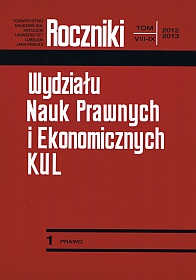Philosophical and Legal Aspects of Border Guard Existence
Abstract
The reality of ended Polish Republic means that it has the right to the border and “Border Guard” as an institution with a task of safeguarding the security of the country. Who should be a border guard officer? Socrates says that a good and diligent guard of the state should be well-mannered and educated. What is this formation in its essence? Its metaphysical nature and Catholicism characterize the essence of the moral and legal structure of the Border Guard; the first dimension can be seen in its unique “subjectivity”, while the other dimension manifests in the concept of a “person”, taken from the Catholic theological thought. the greatest “subjects” of this formation and objects of its concern are the border guard officers, citizens of the Republic of Poland and neighbouring nations, people crossing the border serviced by the Border Guard. the border is generally understood as an external sign of internal and external safety of citizens and their state. What is the final image of the Border Guard in the Republic of Poland? Surely it has to serve and support Poles and their country, but also every person crossing the Polish border. the use of penalties is possible, according to law, as a consequence of breaking the law. It means that the need to respect for human dignity should be the pride of Polish nation and the country.
References
Antonowicz L., T. Guz, M.R. Pałubska (red.), Bezpieczeństwo Polski − historia i współczesność, Wydawnictwo KUL, Lublin 2010.
Aureliusz M., Rozmyślania, tłum. M. Reiter, wyd. II, PWN, Warszawa 1988.
Cortés J.D., Werke in zwei Bänden, Bd. I: Essay über den Katholizismus, den Liberalismus und den Sozialismus, betrachtet in ihren Grundprinzipien und andere Schriften aus den Jahren 1851 bis 1853, hrsg., übers., komm. v. Günter Maschke, VCH Verlagsgesellschaft, Weinheim 1989.
Guz T., K.A. Kłosiński, P. Marzec (red.), Bezpieczeństwo ekonomiczne państw, Polihymnia, Lublin−Tomaszów Lubelski 2006.
Guz T., Bytowanie człowieka jako koegzystencja pewnej nieograniczoności i ograniczoności, w: T. Guz, K.A. Kłosiński, P. Marzec (red.), Granice państwa, Człowiek, Gospodarka, Wydawnictwo KUL, Lublin 2008, s. 9-20.
Guz T., Etyczno-ekonomiczna podmiotowość osoby ludzkiej, w: T. Guz, P. Marzec, Г. Xoрyжий, Т. Cmoвженко (red.), Etyka a ekonomia, Polihymnia, Lublin 2010, s. 183-188.
Hofmann K., Grenze, politische, w: Staatslexikon, hrsg. v. H. Sacher, t. II, wyd. V, Herder, Freiburg i.Br 1927, kol. 811-818.
Homer, Odyseja (wybór), tłum. L. Siemieński, wyd. IX, Zakład Narodowy im. Ossolińskich, Wrocław 1981.
Konopka A. (red.), Bezpieczeństwo publiczne a ochrona granicy państwowej RP, Wyższa Szkoła Administracji Publicznej im. Stanisława Staszica, Białystok 2010.
Konopka A., G. Sobolewski (red.), Bezpieczeństwo granic Rzeczypospolitej Polskiej, Wyższa Szkoła Administracji Publicznej im. Stanisława Staszica, Białystok 2011.
Lesebuch der Antike, t. I: Das klassische Griechenland von Homer bis Aristoteles, Historische Buchgemeinschaft, Gütersloh 1992.
Norwid C., Dzieła wszystkie, t. III: Poematy, oprac. S. Sawicki, A. Cedro, TN KUL/Biblioteka Narodowa, Lublin−Warszawa 2009.
Platon, Obrona Sokratesa, tłum. W. Witwicki, PWN, Warszawa 1988.
Platon, Nomoi, w: Platon, Werke in acht Bänden, hrsg. v. G. Eigler, bearb. v. K. Schöpsdau, gr. Text v. É. des Places, dt. Übers. v. K. Schöpsdau, t. VIII/1, wyd. III, Wissenschaftliche Buchgesellschaft, Darmstadt 1990.
Platon, Politeia, w: Platon, Werke in acht Bänden, hrsg. v. G. Eigler, bearb. v. D. Kurz, gr. Text v. É. Chambry, dt. Übers. v. F. Schleiermacher, t. IV, wyd. II, Wissenschaftliche Buchgesellschaft, Darmstadt 1990.
Platon, Gorgiasz, tłum. Paweł Siwek, PWN, Warszawa 1991.
Proudhon P.J., Wyznania rewolucjonisty, Paris 1849.
Soja M., Stosunki UE-NATO w dziedzinie bezpieczeństwa europejskiego i obrony na przełomie XX i XXI wieku, Wydawnictwo Adam Marszałek, Toruń 2011.
Wahl J., Robert Schuman − Ojciec Europy, tłum. S. Dzida, Wydawnictwo „Wokół nas”, Gliwice 2002.
Z Notatnika Kardynała Augusta Hlonda, oprac. W. Necel, Hlondianum, Poznań 1995.
Copyright (c) 2013 Roczniki Wydziału Nauk Prawnych i Ekonomicznych KUL

This work is licensed under a Creative Commons Attribution-NonCommercial-NoDerivatives 4.0 International License.

